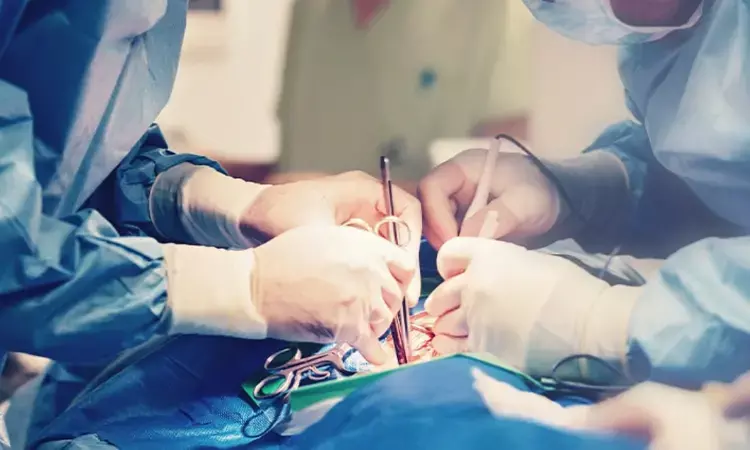- Home
- Medical news & Guidelines
- Anesthesiology
- Cardiology and CTVS
- Critical Care
- Dentistry
- Dermatology
- Diabetes and Endocrinology
- ENT
- Gastroenterology
- Medicine
- Nephrology
- Neurology
- Obstretics-Gynaecology
- Oncology
- Ophthalmology
- Orthopaedics
- Pediatrics-Neonatology
- Psychiatry
- Pulmonology
- Radiology
- Surgery
- Urology
- Laboratory Medicine
- Diet
- Nursing
- Paramedical
- Physiotherapy
- Health news
- Fact Check
- Bone Health Fact Check
- Brain Health Fact Check
- Cancer Related Fact Check
- Child Care Fact Check
- Dental and oral health fact check
- Diabetes and metabolic health fact check
- Diet and Nutrition Fact Check
- Eye and ENT Care Fact Check
- Fitness fact check
- Gut health fact check
- Heart health fact check
- Kidney health fact check
- Medical education fact check
- Men's health fact check
- Respiratory fact check
- Skin and hair care fact check
- Vaccine and Immunization fact check
- Women's health fact check
- AYUSH
- State News
- Andaman and Nicobar Islands
- Andhra Pradesh
- Arunachal Pradesh
- Assam
- Bihar
- Chandigarh
- Chattisgarh
- Dadra and Nagar Haveli
- Daman and Diu
- Delhi
- Goa
- Gujarat
- Haryana
- Himachal Pradesh
- Jammu & Kashmir
- Jharkhand
- Karnataka
- Kerala
- Ladakh
- Lakshadweep
- Madhya Pradesh
- Maharashtra
- Manipur
- Meghalaya
- Mizoram
- Nagaland
- Odisha
- Puducherry
- Punjab
- Rajasthan
- Sikkim
- Tamil Nadu
- Telangana
- Tripura
- Uttar Pradesh
- Uttrakhand
- West Bengal
- Medical Education
- Industry
Kolkata doctors successfully remove needle from 50-year-old man's nasal cavity near brain

A senior doctor of the Institute of Neurosciences Kolkata (INK) said that they the conducted craniotomy, a process generally used to remove a brain tumour or abnormal brain tissue, on the man recently.
Kolkata: Doctors at a private neurological hospital in Kolkata have saved a 50-year-old man who had a needle placed inside his nasal cavity near the brain, performing a surgery by opening a part of the skull.
A senior doctor of the Institute of Neurosciences Kolkata (INK) said that they the conducted craniotomy, a process generally used to remove a brain tumour or abnormal brain tissue, on the man recently.
"The man came to us with one day's history of bleeding from the nose following which he was admitted. When he came to us he was drunk and we had no clue if he had an injury or somebody had hit him.
Also Read: GIMS Noida to Apply for NMC permission to run MD, MS Courses from 2022
So we decided to conduct a CT scan of his skull which showed that a needle extended from his nose till his brain," the doctor said. Despite having the metal object inside the nasal cavity, the man was otherwise clinically ok and fully conscious. "He was talking normally, moving upper and lower limbs as usual and able to walk, eat and drink like a normal person.
We had to do an angiogram to delineate the exact root where the needle was traversing from the nose to the brain. We decided to go in for skull base surgery," he said. The patient's skull had to be opened first and then the needle was pulled out from the nose, said the doctor who was part of the team which conducted the surgery. "It is important to do the craniotomy opening of the skull first, so that the needle is pulled out from the nose and we can tackle any tearing injury that can occur to the major blood vessels inside the brain," he said.
The patient recovered well after the surgery as he had only minor problems like local nasal bleeding which was managed using simple ice packs and he was discharged after three days. However, it is not clear how the needle entered his nasal cavity. "The main point to be noted in this case is that this is a foreign object and it is going through a relatively dirty area (the nose) and contaminating a very clean area, the cranial cavity (which contains the brain and all the major blood vessels)," he explained.
According to the doctor, the surgery needed to be done on a priority basis "or otherwise the infection could have spread through the needle from the nose into the brain". Doctors then sealed the tiny hole left after removing the needle from the nose to stop any leak of cerebrospinal fluid from the cranial cavity or else it could have caused the infection to spread from the nose to the brain. "The patient is doing fine but he requires long term follow-up in the form of a CT scan to rule out any brain abscess (a condition of a painful collection of pus, usually caused by a bacterial infection) and an angiogram to rule out any delayed development of aneurysm (bulge in a blood vessel)," he said.
Also Read: Death of woman after cloth left in stomach during surgery: Inquiry panel submits report
Medical Dialogues Bureau consists of a team of passionate medical/scientific writers, led by doctors and healthcare researchers. Our team efforts to bring you updated and timely news about the important happenings of the medical and healthcare sector. Our editorial team can be reached at editorial@medicaldialogues.in.


